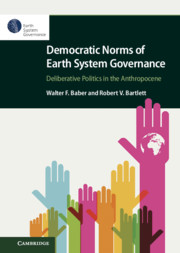Book contents
- Democratic Norms of Earth System Governance
- Democratic Norms of Earth System Governance
- Copyright page
- Contents
- Table
- Acknowledgments
- 1 Democratic Governance in the Anthropocene
- 2 Toward Consensual Earth System Governance
- 3 Empowered Democratic Agency in the Anthropocene
- 4 Embedded Governance Architecture in the Anthropocene
- 5 Experimental Adaptiveness in the Anthropocene
- 6 Equivocal Democratic Accountability in the Anthropocene
- 7 Equitable Access and Allocation in the Anthropocene
- 8 Earth System Democracy
- Afterword
- Notes
- Bibliography
- Index
5 - Experimental Adaptiveness in the Anthropocene
Reconciling Communities and Institutions to Environmental Change
Published online by Cambridge University Press: 12 August 2021
- Democratic Norms of Earth System Governance
- Democratic Norms of Earth System Governance
- Copyright page
- Contents
- Table
- Acknowledgments
- 1 Democratic Governance in the Anthropocene
- 2 Toward Consensual Earth System Governance
- 3 Empowered Democratic Agency in the Anthropocene
- 4 Embedded Governance Architecture in the Anthropocene
- 5 Experimental Adaptiveness in the Anthropocene
- 6 Equivocal Democratic Accountability in the Anthropocene
- 7 Equitable Access and Allocation in the Anthropocene
- 8 Earth System Democracy
- Afterword
- Notes
- Bibliography
- Index
Summary
In the context of earth system governance today, experimentation is no longer merely a virtue but a basic survival skill.Administrative professionals – understood to include administrators national, international, and subnational, both governmental and nongovernmental, across the entire range of policy arenas – are in a position to engage in this best practice for learning from experience, perhaps to a greater degree than any other agents of governance. Protected by both their relative anonymity and their institutional affiliations, they enjoy the dual benefits of relative invisibility and administrative discretion.Administrative professionals can experiment with social and political arrangements that are not only adaptive but are also democratic and effective in reconciling humans to their environment.The volatility of their environments has meant that they face devolved responsibility in governance for both acquiring resources and achieving results.Administrative professionals succeed by being scavengers par excellence, such that approaches that work well anywhere are destined eventually to be tried everywhere.
Keywords
- Type
- Chapter
- Information
- Democratic Norms of Earth System GovernanceDeliberative Politics in the Anthropocene, pp. 104 - 122Publisher: Cambridge University PressPrint publication year: 2021



